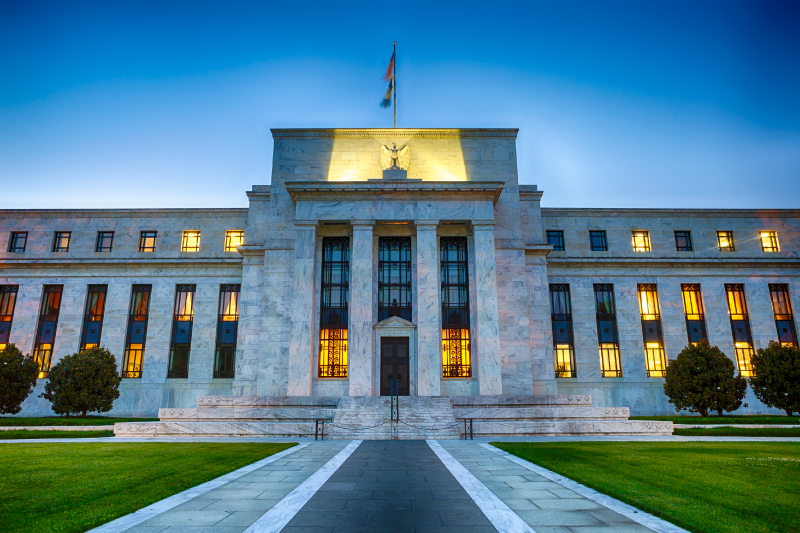Personal Wealth Management / Politics
The Fed’s Independence Doesn’t Seem at Risk
In our view, President Trump’s recent statement expressing his monetary desires doesn’t constitute tampering with central bank independence.
Fed head HQ—the Eccles building, named after an independent-minded fellow—is both physically and institutionally set away from Treasury. (Photo by traveler1116/iStock by Getty Images.)
Obligatory political disclaimer: We endeavor to be politically agnostic and favor no party or politician as bias blinds when investing.
President Trump recently stated he would prefer the Fed keep interest rates low,[i] triggering an uproar among Fed-fixated pundits.[ii] Doesn’t this threaten the Fed’s vaunted independence, potentially politicizing policy?[iii] In our view, no. While monetary policy can be a big deal—and investors should be wary of undue political influence over it—the Fed’s independence doesn’t seem to be in jeopardy. For investors, we believe this is just another brick in the wall of worry bull markets proverbially climb.
Politicians’ commenting on central bank decisions isn’t especially novel—and doesn’t necessarily constitute interference. A couple weeks ago, when asked about the Fed’s recent hikes, the president said: “I’m not thrilled … Because we go up and every time you go up they want to raise rates again. I don’t really—I am not happy about it. But at the same time I’m letting them do what they feel is best.” Is this infringing on the Fed’s independence? If the Fed pauses—like it did Wednesday—is this now proof the Fed is compromised? Is it more compromised now than it was over the last 18 months—and 5 rate hikes—considering Trump said very similar things right after winning the election? Doesn’t seem like it to us. And, heck, the idea of a completely rational, apolitical Fed making quasi-scientific decisions over money supply is a figment of academic imagination. Last we checked, the Fed head was still appointed by the president, and no credible legislation aims to change that.
As it is, the Fed has never been fully isolated from politics. From 1914 – 1936, the Treasury Secretary and Comptroller of the Currency sat on the Fed’s board. After WWII, President Truman—wanting the Fed to monetize war debts—replaced Fed head Marriner Eccles,[iv] who objected to the resulting 20% inflation. This led to 1951’s Treasury-Fed Accord giving the Fed monetary autonomy to set rates based on economic conditions—not Treasury’s financing needs. But this didn’t end challenges to Fed independence. For example in 1965, LBJ invited longest-serving Fed head William McChesney Martin, Jr. to his Texas ranch and reportedly threw him against a wall saying, “Martin, my boys are dying in Vietnam and you won’t print the money I need.”[v]
President Nixon appointed his economic advisor Arthur Burns as Fed head in 1970. Inflation soared, due in large part to non-Fed government meddling, but also because of a compliant Fed. Hence, Congress’s Federal Reserve Reform Act of 1977, which enshrined “stable prices” as a primary Fed objective. Many believe this ushered in Fed independence’s modern era. Yet President Reagan still railed against Volcker’s high rates—which quelled 1970’s inflation—replacing him with second longest-serving Fed head Alan Greenspan. President HW Bush complained Greenspan cost him a second term by not cutting rates enough (albeit years after). While the Fed isn’t completely independent, it has come a long way. Trump’s comments alone aren’t likely to reverse it. That doesn’t mean politicizing the Fed isn’t a risk. As history shows, inappropriate policy is likelier when central banks are under politicians’ thumbs. But the policy risk is the kicker.
People worried about a politicized Fed really worry about monetary policy being wrong for present economic conditions. So the better question: Are central bankers erring? They set one of the economy’s and financial markets’ key rates—overnight money’s price. Besides that, they are lenders of last resort—their original raison d’être—providing liquidity for otherwise solvent banks and other financial institutions (with collateral to pledge)[vi] when needed. Sometimes they do this admirably. Other times not so much. If the Fed keeps rates too low when inflation is galloping, raises short-term rates above long rates or fails to provide liquidity during a banking crisis, those are all legitimate concerns! The Fed’s independence may play a role in all these circumstances, but for investors, it is likely down the list of what is actually driving markets. What matters more is whether inflation is under control, borrowers can access credit and the public has a reasonable amount of faith in the Fed’s ability to do its job, with or without interference.
The Fed will never be entirely insulated from political pressure. President Trump’s airing his monetary preferences may raise eyebrows, but compared to past strong-arming it hardly measures. Overall, we think this furor over a relatively minor episode is bullish for stocks. The more folks realize people behind the curtain aren’t running the show and focus on the market’s positive fundamentals, the less intrigue and hearsay weigh on stocks.
[i] “Trump Blasts Powell’s Rate Hikes, Trespassing on Fed’s Independence,” Christopher Condon, Craig Torres and Jeanna Smialek, Bloomberg, 7/19/2018. https://www.bloomberg.com/news/articles/2018-07-19/trump-trespasses-on-fed-independence-blasting-powell-rate-hikes
[ii] “Trump’s Fed Criticism Is Nearly Without Precedent in US History,” Jeff Cox, CNBC, 7/19/2018. https://www.cnbc.com/2018/07/19/trumps-fed-criticism-is-nearly-without-precedent-in-us-history.html
[iii] “As the Fed Meets, the Specter of Pressure From Trump and the Market Looms,” Jeff Cox, CNBC, 7/31/2018. https://www.cnbc.com/2018/07/31/as-the-fed-meets-the-specter-of-pressure-from-trump-and-the-market-lo.html
[iv] Fed head HQ is named after him.
[v] “A President at War With His Fed Chief, 5 Decades Before Trump,” Kevin Granville, The New York Times, 6/13/2017. https://www.nytimes.com/2017/06/13/business/economy/a-president-at-war-with-his-fed-chief-5-decades-before-trump.html
[vi] If the Fed deems it worthy and with a haircut of its choosing.
If you would like to contact the editors responsible for this article, please message MarketMinder directly.
*The content contained in this article represents only the opinions and viewpoints of the Fisher Investments editorial staff.
Get a weekly roundup of our market insights
Sign up for our weekly e-mail newsletter.

You Imagine Your Future. We Help You Get There.
Are you ready to start your journey to a better financial future?

Where Might the Market Go Next?
Confidently tackle the market’s ups and downs with independent research and analysis that tells you where we think stocks are headed—and why.






